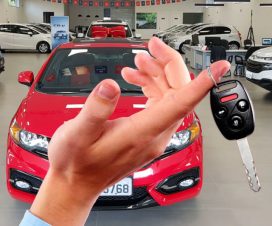 |
It’s 2024, and the world of online car buying has changed drastically. It’s now easier than ever to get a great deal on a car, but there are also more traps than ever that you should be aware of when shopping online. This blog post will look at common traps to avoid when buying a car online in 2024. We’ll discuss everything from hidden fees to misleading advertising and more. By the end of this article, you’ll have all the knowledge you need to make sure your car purchase is free from any snags or pitfalls.
1. The Search for the Perfect Car

Source: unsplash.com
If you’re in the market for a new car, you’ll want to be careful of some common traps that can leave you overpaying or with a vehicle that’s not right for you. Here are seven traps to avoid when buying a car online:
-
The Search for the Perfect Car
Many shoppers spend hours online searching for the perfect car, only to find that it’s unavailable in their area or it’sout of their price range. Be realistic about what you’re looking for, and don’t get too attached to any one particular model. Some trusted sites offer a wide range of choices and allow you to buy cars online at exclusive prices.
-
Failing to Research Prices
It’s essential to know how much cars like the one you’re interested in typically sell for before you start negotiating with a dealer. Use online resources like Kelley Blue Book or Edmunds to get an idea of fair market value so you only end up paying what you should.
-
Skipping the Test Drive
A test drive is essential to making sure a car is a good fit for you. Don’t skip this step just because you’re buying online – make arrangements with the dealer to bring the vehicle to you so you can take it for a spin before committing to purchase.
-
Not Reading the Fine Print
When signing an agreement to purchase a car, be sure to read all the terms and conditions carefully. Pay attention to things like the length of the warranty, what type of financing is available, and what your rights are.
2. The Used Car Lemon

Source: thenewdaily.com.au
If you’re in the market for a used car, beware of the used car lemon. This is a common trap that many online car buyers fall into. Here’s how it works:
You find a great deal on a used car online, but when you go to pick it up, the car is different from what was advertised. It may be in poor condition, or it may be different from the same make and model.
This is why it’s important to research before buying a used car online. Make sure you read the reviews of the seller before you buy, and test-drive the vehicle before you commit to anything.
3. The In-person Test Drive

Source: buycarblog.com
When it comes to car buying, nothing beats an in-person test drive. There’s no substitute for getting behind the wheel and taking a car for a spin to see if it’s the right fit for you. However, there are a few things you should keep in mind when test-driving a car:
- Make sure you have a valid driver’s license and insurance.
- Ask the salesperson questions about the car before you get behind the wheel.
- Take your time driving the car. There’s no rush – take your time to get a feel for how it handles and performs.
- Pay attention to your surroundings while driving, and be aware of other cars on the road.
- When you’re finished test driving, be sure to ask the salesperson any remaining questions you have about the car before making a decision.
4. The Finance and Insurance office

Source: westernfinancialgroup.ca
In the market for a new car but need help figuring out where to start? The internet has made buying a car more effortless than ever before, but it also comes with its own set of traps. Here are two common online car-buying pitfalls to avoid:
- The Finance and Insurance office: This is one trap that can be easily avoided by doing your research ahead of time. Know what type of financing you need and what interest rate you’re comfortable with before you even step foot in the dealership. The same goes for insurance; get quotes from multiple companies so you can compare rates and coverage.
- The add-ons: Once you’ve negotiated the price of the car, resist the pressure to buy additional items like extended warranties, gap insurance, or paint protection. These are all things that can be purchased later on if you decide you need them.
5. The Trade-In

Source: carfax.ca
When you’re looking to buy a new car, it’s easy to get caught up in the allure of a shiny new set of wheels. But before you start signing on the dotted line, there are a few traps that you’ll want to avoid.
One common trap is the trade-in trap. Many dealerships will try to lowball you on your trade-in in order to make a more significant profit on the sale of the new car. They may also try to pressure you into trading in your old car, even if it’s not worth very much.
If you’re not planning on trading in your old car, be firm and tell the dealer that you’re not interested. If you plan on trading it in, do your research ahead of time, to know what it’s worth. That way, you can be sure you’re getting a fair deal.
6. The Extended Warranty

Source: retirementliving.com
An extended warranty is a type of service contract that covers repair and replacement costs for your vehicle after the manufacturer’s warranty expires. Extended warranties are a waste of money, but they can actually be a valuable way to protect your investment.
When you’re buying a car, you should always consider whether or not an extended warranty makes sense for you. If you’re planning on keeping the car for a long time or are worried about expensive repairs, an extended warranty could save you a lot of money in the long run.
Conclusion
When you’re looking to buy a car online, there are a few scams that you should be aware of. By being aware of these scams and taking some basic precautions, you can help ensure that your online car-buying experience is safe and successful. In addition, it is essential to research any dealer or private seller before making a purchase, as there have been cases of fraudsters posing as legitimate sellers to take advantage of unsuspecting buyers. However, there are credible websites that offer legitimate car-buying deals.




